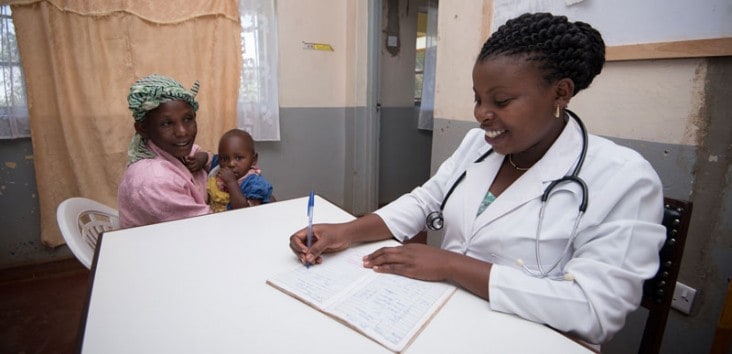MEASURE Evaluation supported countries to strengthen their health information systems (HIS) and built the capacity to generate and use high-quality information for informed and evidence-based decisions that improved the health of their people. JSI, a partner on the project since 1997, led HIS strengthening and capacity-building activities in seven countries that focused on increasing demand for health information; developing tools; improving data collection practices and data analysis; and importantly, strengthening the use of information.
Health programs and interventions are less likely to be efficient or effective without the evidence that can inform decision-making. The availability of quality data to guide policies, program strategies, and financing is key and there is a need for countries in low-resource settings to be empowered to identify, collect, analyze, and use high quality information to improve health outcomes.
MEASURE EVALUATION
The project was driven by a vision that public health programs have reliable systems for making decisions based on sound data and evidence.
Through MEASURE, in Ethiopia, JSI worked with the Federal Ministry of Health (FMoH) to develop the HMIS/M&E strategy, which was subsequently used to craft pivotal components of the Health Sector Development Program (HSDP). The objective was to make HMIS one of the core components of the “One Plan, One Budget, One Report” policy.
With JSI support, the Southern Nations Nationalities and People’s Region (SNNPR) deployed the reformed HMIS in 14 administrative zones and 5 special woredas (districts).
Under the project, JSI also implemented a community health information system covering more than 3,800 health posts in SNNPR, and over 6000 health posts in Oromia and instituted procedures to improve HMIS data quality and information use at every level of the health system. JSI continues to follow up the work done under MEASURE Evaluation in Ethiopia through the Gates-funded Data Use Partnership (DUP).
DHIS2
Through the project, JSI supported the Ministries of Health in Burundi, Guinea, Côte d'Ivoire, Mali, Liberia, Nigeria, Senegal, Tanzania, Madagascar, and Burkina Faso in the deployment of DHIS2. We provided technical assistance and capacity building in its application at national and sub-national levels. JSI provided technical leadership in the development of the associated DHIS2 training curricula that features issues on data quality, analysis and use at all levels.
Through the project, JSI has been supporting the government in Côte d’Ivoire to develop and implement the country’s HIS architecture and strengthen monitoring and evaluation. Since DHIS2 was rolled-out nationally in 2014, JSI has provided technical assistance to develop an interoperability layer for DHIS2 that integrates data from DHIS2 with data in other systems, among other activities.
PRISM Framework
JSI led the development of the Performance of Routine Information System Management (PRISM) framework to gauge performance of RHIS (i.e., level of data quality and use), measure capacity for high-performing RHIS, and identify and address gaps and weaknesses in the system. In the past 10 years, since the introduction of PRISM, more than 30 countries have applied the tools at different administrative levels. JSI recently led a process to update the PRISM toolkit and align it with other important RHIS assessment tools (e.g., DQR).
JSI has also worked collaboratively to develop guidelines for RHIS data management to help countries ensure that data management tools, methods, and practices adhere to globally recognized standards.
In response to findings from HMN country assessments (which revealed data management as the poorest performing aspect of routine health information systems globally), through MEASURE Evaluation, we convened expert reviews to outline global standards for RHIS data management. The resulting output was developed into a guidelines document, ‘RHIS Data Management Standards’ to provide a gold standard for countries to use in RHIS reform efforts. JSI subsequently collaborated with WHO on the development of an assessment tool based on the standards, the RHIS Rapid Assessment Tool, which facilitates the identification of gaps and inadequacies (i.e. aspects of RHIS not meeting the global standard) in RHIS prior to system reform efforts. As part of the development process, JSI implemented the RHIS Rapid Assessment Tool in Malawi and Madagascar.
MEASURE HIS
As a key partner on MEASURE Evaluation Phases III and IV (2009-2019), JSI contributed to project impact, strengthening HIS, including:
- More than 75 regional, national, or sub-national institutions demonstrated increased capacity to independently carry out M&E/HIS activities.
- 37+ RHIS or M&E systems demonstrated improvement in system performance.
- 45+ documented instances where data was used to inform programs, policy or advocacy as a result of MEASURE Evaluation activities.





